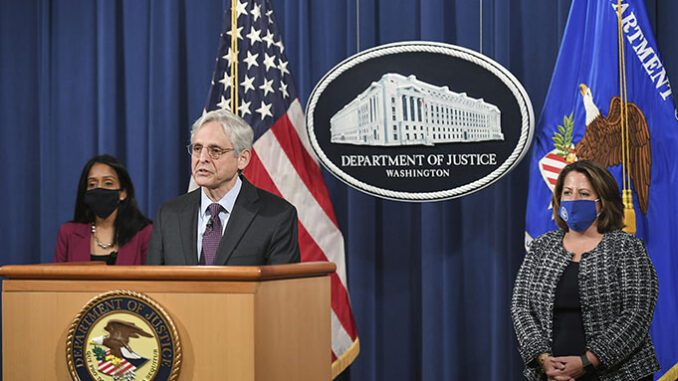
WASHINGTON, D.C. — The Justice Department will scrutinize a wave of new laws in Republican-controlled states that tighten voting rules, Attorney General Merrick Garland said, vowing to take action against states on any violations of federal law.
He announced plans to double staffing within the department’s civil rights division and said the department would send guidance to states about election-related activity, including absentee by-mail voting and post-election audits. He also pledged to investigate and prosecute those who would threaten election workers, noting a rise in such cases.
“There are many things open to debate in America, but the right of all eligible citizens to vote is not one of them,” Garland said in his first direct response to the election integrity laws being passed in more than a dozen states where Republicans control the legislature and governor’s office.
Speaking to staff of the agency’s civil rights division, he said the resources of the Justice Department must be rededicated to “meet the challenge of the current moment.”
His message was clear: The department doesn’t plan to stay on the sidelines of the voting battles that have erupted in statehouses across the country. Along with reviewing new state laws, Garland said the department also will examine existing ones for their potential to discriminate against minority voters.
He also reiterated the administration’s support for two proposals pushed by congressional Democrats that would federalize voting and would restore the ability of his agency to review changes to state election laws.
Republican state lawmakers in Arizona, Florida, Georgia, Iowa, Texas and elsewhere seized on concerns over voter integrity. As of mid-May, 22 restrictive laws had passed in at least 14 states, according to the left-leaning Brennan Center for Justice, which advocates loosening voting laws.
Republicans in Texas are expected to call for a special session to push through an election overhaul that was derailed by Democrats on the last day of the regular session.
Republicans who support the new laws said action was needed to safeguard voting and restore public confidence in elections.
“Americans have been clear: they support laws making it easy to vote and hard to cheat in states across the country,” said Jessica Anderson, executive director of Heritage Action, which has been working to advance the legislative proposals. “Despite the false narrative coming out of the White House and now the Department of Justice, Americans support secure, fair elections, even if the Left does not.”
Voting right groups already have filed several lawsuits challenging the laws.
Garland’s comments come as the Justice Department is shifting its priorities to focus more on civil rights issues and ensuring equal protection under the law after a tumultuous four years in the Trump administration.
Along with tightening voting rules, Republicans also have pushed measures to expand the role of poll watchers, following complaints that their monitors did not have adequate access during the 2020 election. In Florida, a new law allows each candidate to have one watcher present during canvassing board meetings.
In a bill that eventually failed but is expected to be revived during a special legislative session, Texas Republicans pushed broad new criminal penalties for election workers who impede poll watchers.
Republican state senators in Arizona to use their subpoena power and launch a review of the 2.1 million ballots cast in Maricopa County. The audit will not change the outcome of the election, which was certified by the state’s Republican governor, a standard procedure following every election. But Trump has called for more reviews in other states, including Georgia and Pennsylvania.
The Justice Department has sent a letter expressing concern about the Arizona review, and Garland vowed that his department would ensure any post-election review abides by federal law to “protect election records and avoid the intimidation of voters.”
Arizona’s current Secretary of State and chief elections officer, Katie Hobbs, announced last Wednesday her candidacy for the Democratic nomination for governor in 2022 while denouncing the Republican-controlled state Senate’s ongoing audit.
“Arizonans are tired of the partisanship,” Hobbs said. “We are currently being led by a group of conspiracy theorists who are not in touch with everyday Arizonans, and that is holding us back. And I’ve always been able to break through that and get things done,” said Hobbs in an interview.



